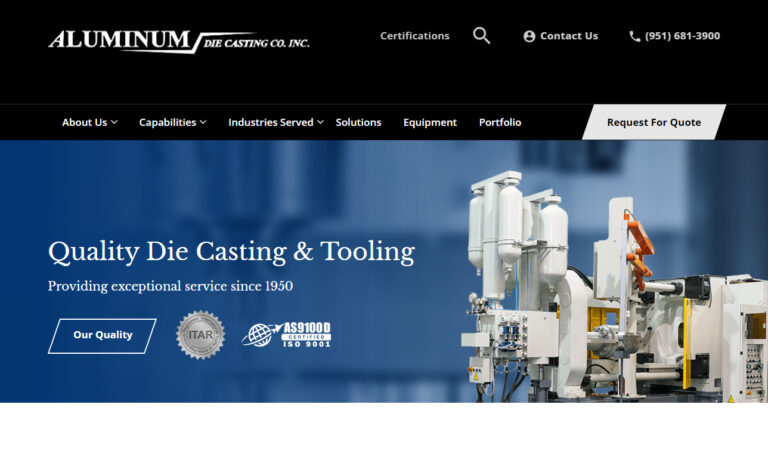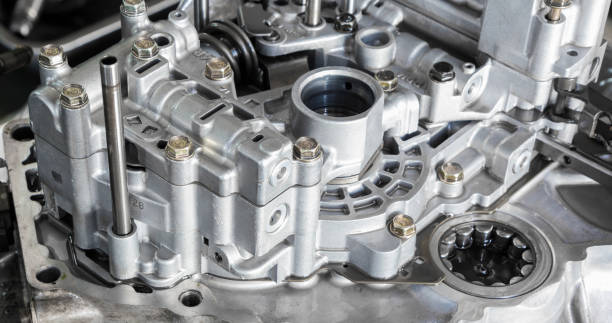7 Simple Techniques For Alcast Company
Wiki Article
The 3-Minute Rule for Alcast Company
Table of ContentsGet This Report about Alcast CompanyThe Best Strategy To Use For Alcast CompanyGetting The Alcast Company To WorkMore About Alcast CompanySome Known Facts About Alcast Company.Some Ideas on Alcast Company You Need To Know
The subtle difference depends on the chemical web content. Chemical Comparison of Cast Light weight aluminum Alloys Silicon advertises castability by reducing the alloy's melting temperature and improving fluidness during casting. It plays a crucial function in permitting intricate molds to be filled up accurately. Furthermore, silicon adds to the alloy's strength and use resistance, making it beneficial in applications where durability is crucial, such as automobile parts and engine elements.It likewise improves the machinability of the alloy, making it much easier to process into finished items. In this method, iron contributes to the overall workability of aluminum alloys.
Manganese contributes to the toughness of aluminum alloys and boosts workability. Magnesium is a lightweight element that gives toughness and impact resistance to light weight aluminum alloys.
The Buzz on Alcast Company
It allows the production of lightweight elements with superb mechanical residential properties. Zinc boosts the castability of light weight aluminum alloys and helps manage the solidification procedure throughout casting. It boosts the alloy's strength and hardness. It is usually found in applications where complex forms and fine details are needed, such as attractive spreadings and certain automotive components.
The primary thermal conductivity, tensile strength, yield stamina, and prolongation vary. Select appropriate basic materials according to the performance of the target item produced. Among the above alloys, A356 has the highest possible thermal conductivity, and A380 and ADC12 have the most affordable. The tensile limit is the opposite. A360 has the finest return strength and the highest elongation rate.
The Buzz on Alcast Company

In precision spreading, 6063 is appropriate for applications where elaborate geometries and top notch surface area finishes are critical. Instances consist of telecommunication units, where the alloy's premium formability permits for smooth and aesthetically pleasing designs while maintaining structural honesty. In a similar way, in the Illumination Solutions sector, precision-cast 6063 components develop elegant and efficient lighting components that need elaborate shapes and great thermal efficiency.
It brings about a finer surface area finish and better rust resistance in A360. In addition, the A360 displays remarkable prolongation, making it optimal for complex and thin-walled parts. In accuracy casting applications, A360 is appropriate for markets such as Customer Electronics, Telecommunication, and Power Devices. Its improved fluidity allows for intricate, high-precision components like smartphone casings and interaction device housings.
Some Known Facts About Alcast Company.
Its one-of-a-kind residential or commercial properties make A360 a valuable choice for accuracy spreading in these markets, boosting item toughness and quality. aluminum casting company. Aluminum alloy 380, or A380, is an extensively used spreading alloy with several distinctive characteristics.
In accuracy casting, light weight aluminum 413 beams in the Consumer Electronic Devices and Power Devices sectors. It's commonly used to craft complex parts like smart device real estates, camera bodies, and power tool coverings. Its accuracy is amazing, with tight tolerances approximately 0.01 mm, ensuring perfect item setting up. This alloy's superior corrosion resistance makes it an outstanding selection for outside applications, guaranteeing resilient, sturdy products in the mentioned markets.
Getting My Alcast Company To Work
The aluminum alloy you select will significantly impact both the casting process and the residential or commercial properties of the last product. Due to the fact that of this, you must make your decision carefully and take an enlightened method.Establishing the most appropriate light weight aluminum alloy for your application will indicate evaluating a broad variety of qualities. These relative alloy features adhere to the North American Pass Away Spreading Association's standards, and we have actually split them into 2 groups. The initial group addresses alloy qualities that impact the production process. The second covers features influencing the homes of the final product.
Alcast Company - The Facts
The alloy you select for die spreading directly impacts a number of facets of the spreading process, like how simple the alloy is to collaborate with and if it is prone to casting flaws. Hot fracturing, likewise referred to as solidification fracturing, is a common die casting flaw for aluminum alloys that can lead to internal or surface-level rips or fractures.Particular aluminum alloys are more prone to warm cracking than others, and your choice needs to consider this. It can damage both the cast and the die, so you must look for alloys with high anti-soldering residential or commercial properties.
Rust resistance, which is already a notable feature of light weight aluminum, can differ significantly from alloy to alloy and is a necessary characteristic to think about depending upon the ecological conditions your product will certainly be exposed to (aluminum metal casting). Put on resistance is an additional residential property frequently sought in light weight aluminum products and can distinguish some alloys
Report this wiki page